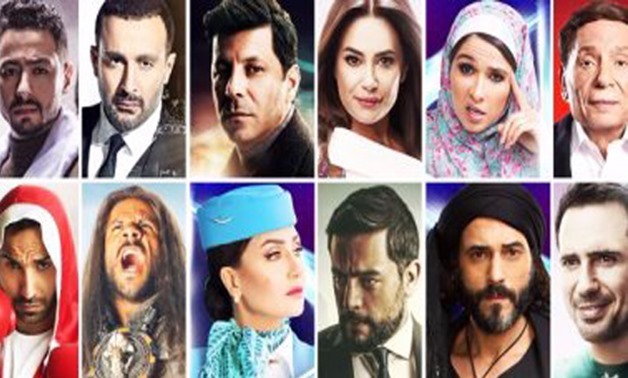
Ramadan stars - File Photo
CAIRO - 28 June 2017: Unfortunately, most people only manage to watch two or three drama series in Ramadan, but now that the holy month is over all the drama series’ will be replayed. To help you decide what to start watching or avoid, here is a list of the best and worst bits of Ramadan series.
1- If you are going to break a record (more than $10 million) on drama production make sure it is worth the risk with realistic plot and script. Most importantly get your money’s worth and don’t just end the drama at episode 20. “Gharabeb Soud:” MBC’s biggest failure this Ramadan.
2- Nelly Karim, Yusra and the Adel Group’s partnership continues and although viewers are still loyal to this combination, I think this year the audience’s loyalty was tested to the max and it will not do the same again next year if there is not a major change in the Adel Group’s writing and production. Also, Nelly Karim must follow the example of Yusra and play a new kind of role rather than the usual downtrodden woman who tolerates betrayal and abuse then seeks revenge but remains pure. “Le A’ala Sea’r” and “Al-Hesab Yegmaa” both had potential, but were ruined by less-than-great writing.
3- Ramadan has traditionally been the month where rising stars are born and this year was no exception. Asma Abu Al-Yazid was exceptional in her role of Tuqa in “Hatha Al-Masa’” as was the brilliant child actress Malak Assem, who played the role of Noor so convincingly and movingly. Khaled Anwar is another rising star who was also very impressive as Tereka in “Hatha Al-Masa’.”. Other successful new faces were Diana Hesham and Hazem Ehab. Both will have a bright future in the acting industry.
4- This year’s best Ramadan series has to be “Hatha Al-Masa’” with a daring new plot that explores the world of social media, hacking and the danger of smartphones. The casting was spot on and the settings, scenes and everything about it was flawless.
5- Ahmed Dawood, Mohamed Farag, Ayad Nassar (“Hatha Al-Masa’”); Taim Hassan, Awayes al-Makhlati (“al-Haybeh”); and Sayed Ragab, Muhammad Al-Ahmad (“Gharabeb Soud”) were by far the best actors to watch this Ramadan, followed by Ahmed Malek and Muhammad Mamdouh who were both good and could have been great if they had a better script.
6- Actresses that regenerated themselves were: Yusra, who was back to playing a difficult and multi-dimensional role, reviving old memories of her best roles; Aseel Omran in “Gharabeb Soud” was probably the best female in the drama as she played her role so convincingly - in fact, it may be her best performance yet!
7- There was a new trend in Ramadan series that some might claim reflects reality but it certainly does not reflect Egyptian or Arab traditions and customs: the constant drinking of alcohol at various times of the day as though it was a natural thing that Arabs do at dinner or lunch time.
8- Hanan Motawea is probably the biggest discovery this Ramadan. Like the abovementioned two actresses she reinvented herself in a remarkable way. In “Halawet a-Dunia” she is convincing as the funny, happy-go-lucky, supportive and natural best friend of Amina and likewise in “Hatha Al-Masa” she masters the role of Abla, a feisty, strong woman who is tricked twice by selfish men. It is likely that Motawea will be the star next Ramadan series rather than playing supporting roles. In fact, the roles of both Hend Sabri and Arwa Gooda - the supposed stars of the series - were in fact overshadowed by Motaw’a.
9- The best music came from “Le A’ala Sea’r” and “al-Haybeh,” with both their opening credit songs attracting millions before either series was even aired. “Majbour” (”Forced To”), sung by the former Star Academy participant Nassif Zeytoun, and Nawal Zoghby’s “Al Nass Al Ozaaz” captured not only the theme of the drama series but the mood and feeling of the audience. “Le A’ala Sea’r” may have failed as a drama series but it was successful with its music as it had another song which caught the attention of many, Hagrteni which was part of the series plot and was sung by Heidi Musa, the former Arab Idol contender. Shereen’s title song for “Halawet al Dunia” was touching but did not prove to be as popular as the others. The same goes lies for Poussi’s song for “Al Hesab Yegma’a” and Nawal Zoghby’s “Caramel” opening credit. They were all good, just not as catchy.
10- Most of the drama series this year had a fairly happy ending, in contrast to last year’s dramatic ends where death was the common factor.

Comments
Leave a Comment